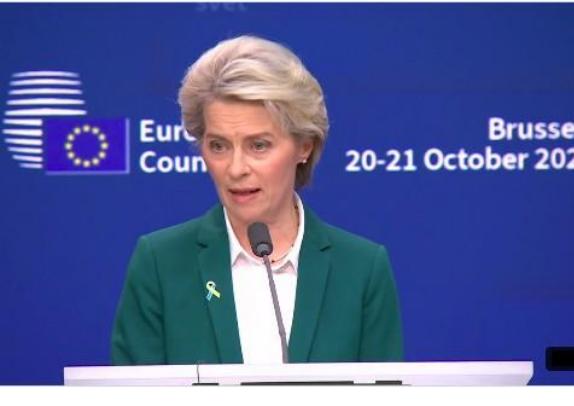European Commission to prepare a plan to transfer proceeds of frozen Russian assets to Ukraine by the end of the year
The EC will present a plan in early December to facilitate the transfer of proceeds from frozen assets to Ukraine

EU leaders have approved plans to use billions of euros in proceeds from frozen Russian assets to help Ukraine.
Source. This was reported by the Financial Times.
According to the publication, the European Commission may put forward a proposal in early December.
Western sanctions since the beginning of the Russian invasion have frozen about $300 billion belonging to the Russian central bank.
Of this, 180 billion euros, according to the Belgian government, is kept in Euroclear, the world's largest securities depository headquartered in Brussels, the article says.
"Politically, we agreed that ultimately Russia has to pay for the long-term recovery of Ukraine," European Commission President Ursula von der Leyen said on Friday after the EU leaders' summit in Brussels.
"We are currently working on a proposal to focus on the so-called windfall profits," she added. The idea is that we pool them and channel them through the EU budget to Ukraine."
The European Commission intends to present a plan in early December that would make it easier to transfer the proceeds of frozen assets to Ukraine, two senior officials involved in the preparation of the decision told the Financial Times.
Euroclear on Thursday said it earned €3 billion from frozen Russian assets in the first 9 months of this year alone, up from €347 million in the same period in 2022, with the increase driven by rising interest rates, the Financial Times reports.
According to the newspaper, coupon payments and bond redemptions on immobilized Russian assets remained in Euroclear, as they cannot be paid to clients subject to sanctions. The depository regularly reinvests such balances, and rising interest rates mean that Euroclear earns more from these investments.
EU officials are looking for ways to channel these revenues to Ukraine, but the European Central Bank has warned of potential risks to the euro from access to these revenues, as it could encourage other central banks to divest from euro assets and thereby weaken the euro.
If you have read this article to the end, we hope that means it was useful for you.
We work to ensure that our journalistic and analytical work is of high quality, and we strive to perform it as competently as possible. This also requires financial independence. Support us for only UAH 196 per month.
Become a Mind subscriber for just USD 5 per month and support the development of independent business journalism!
You can unsubscribe at any time in your LIQPAY account or by sending us an email: [email protected]



